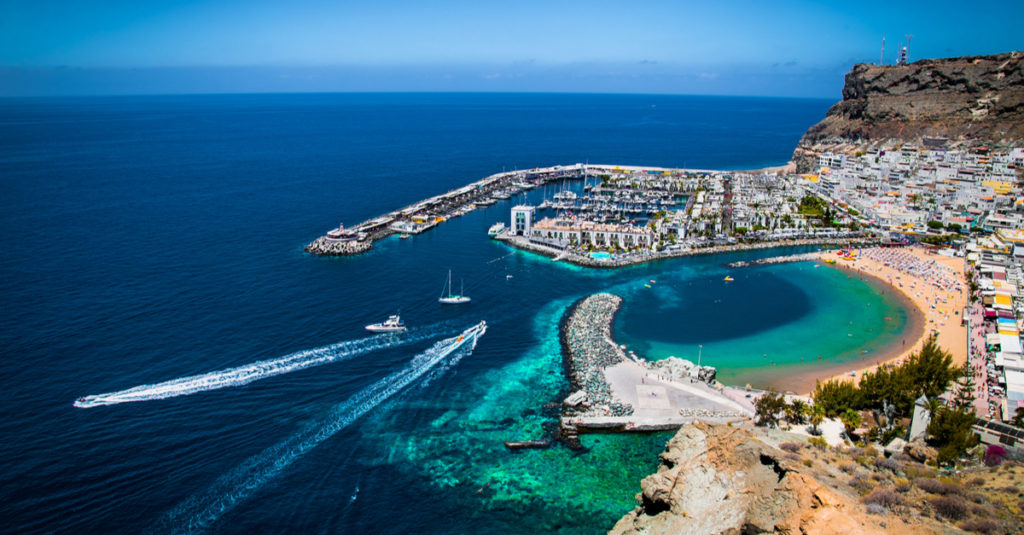This heavenly island is successfully embracing what the World Tourism Organization (UNWTO) stated as the new currency within the tourism industry: trust. To communicate the safety of both Gran Canaria and the whole of the Canary Islands as a tourist destination, several initiatives are involving different industry’s stakeholders.
A special visit
The destination managed to control the level of infections produced by the pandemic, yet tourism was affected like everywhere else. Before the COVID-19 outbreak, the industry’s contribution to the Canary Islands’ GDP was around 35%. Because of the importance of travel and tourism for the island, the local authorities arranged an official visit for members of the UNWTO, travel agents and journalists, as well as key workers granted with a vacation on the island due to their efforts battling the pandemic at its worst moments. The main goal for this visit was to endorse the destination’s recovery.
At the beginning of July, around 180 people arrived at Gran Canaria’s airport from Madrid, including relevant personalities like UNWTO’s Secretary-General and Spain’s Minister for Tourism. This flight helped to evaluate the safety protocols like PCR tests and a mobile application named hi + card which stores tests’ results. Once on the island, the expedition enjoyed outdoor activities such as a boat trip to Pasito Blanco, a modern yacht marina, as well as a hiking route through the mountains from an impressive volcanic rock (Roque Nublo) to a village awarded as one of the most beautiful ones in Spain: Tejeda. The group also had the opportunity to stroll around the island’s capital, Las Palmas de Gran Canaria, while visiting the old town (Vegueta) and the Port area. But the journey did not stop in the capital, the expedition travelled to the north region of the island to delight themselves exploring the coffee plantations in Agaete. During this tour, they also admired the heritage represented in the archaeological parks of Cueva Pintada and the Cenobio de Valerón, vestiges of the ancient indigenous who inhabited the island. Finally, the group of journalists, travel agents and politicians visited the southern region of the island. In here, the first visit was the iconic landmark of the dunes in Maspalomas along with the emblematic lighthouse. Afterwards, they tour the scenic coastal town of Puerto de Mogán.
Message to industry
Within a busy itinerary full of excursions, walks and gastronomic tastings there was also room for press conferences. Communication played a crucial role in this visit, especially channelled by the group of journalists from numerous sources including The New York Times, Deutsche Welle or El País, among others. In one of the press releases, the UNWTO’s Secretary-General underlined that the destination is open, safe, and willing to welcome both international and domestic visitors. Later in his intervention, Zurab Pololikashvili added that the safety protocols are efficient and do not pose a problem for tourists to relax while they enjoy their holidays in Gran Canaria.
Following the previous statement, local authorities supported the readiness of the Canary Islands to do everything to minimize any risks related to COVID-19. Thanks to the flights provided by Binter, the Canarian airline, the expedition members visited the rest of the archipelago. The expedition went through the exact same steps that any traveller would follow when visiting the destination. With measures in place such as wearing face coverings, using handwashing stations and temperature checks, there are not any intrusive protocols. It should be noted that these actions apply through the whole visitor experience, from the airport to accommodation sites, transports, and restaurants. To conclude, Pololikashvili claimed that the model implemented by the Canary Islands’ government is trustworthy and can be applied in other destinations. On behalf of the UNWTO, he conveyed the message that the archipelago’s tourism industry is likely to fully resume its normal activity by October.
More measures to generate consumer confidence
The visit of the UNWTO along with other industry’s professionals is not the only measure which seeks to propel tourism in the Canaries. A new development fund aims to stimulate airlines to reinstate their flights to the archipelago. Before the pandemic, around 150 destinations of more than 25 countries had air connections to the Canary Islands’ airports. Following this, Jet2 is resuming its flights with the destination from the second half of July so British tourism can be boosted. Last year, the company carried around 1.5 million visitors to the Canaries.
But air connectivity is not the only area subject to economic stimulation. During her visit to the Canaries, Spain’s Minister of Tourism announced that the archipelago will be granted a specific investment plan with a special focus on infrastructure’s development. A much-needed investment for a destination chosen by 13 million travellers for their vacations in 2019. To conclude this set of economic measures, Spain’s government confirmed the extension of furlough schemes until December 2020.
Within the travel industry, the MICE sector is particularly impacted by COVID-19. However, a massive crisis like this pandemic has turned into an opportunity. At the beginning of July, a group of companies from different islands created the Canary Association of MICE Industry. Its main objective is to increase the visibility of the sector. More and more events start to take place in the destination. For example, next October the ABTA Travel Convention will be in Gran Canaria. In addition, two emblematic events for both international visitors and locals set new dates on the island. In October, Maspalomas Gay Pride’s celebration will take place during a week. On the other hand, the world-famous Las Palmas de Gran Canaria Carnival will take place in May 2021 after being cancelled earlier this year.
You may also be interested in…
- How can destinations support domestic tourism?
- Will 2020 define the future of tourism?
- SMART Tourism Will Help Destinations Reopen Faster And Safer During The COVID-19 Crisis
